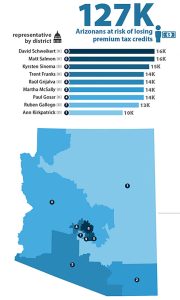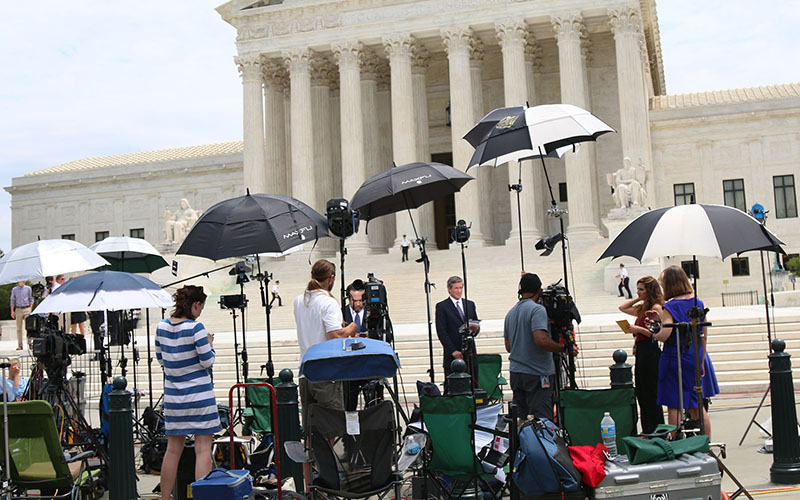WASHINGTON – For Arizona resident Jorge Mendez, subsidies under the Affordable Care Act made it possible for him to afford the health insurance that helps him cope with debilitating joint and muscle issues.
Which is why Mendez was “so happy” to learn that the Supreme Court on Thursday rejected the latest challenge to Obamacare and upheld the subsidies that help lower-income Americans get insurance.
“It was really great,” said Mendez, one of an estimated 127,000 Arizona residents – and more than 8.5 million nationwide – who used the subsidies to buy coverage and who stood to lose it if the court ruled the other way.
In one of the most highly anticipated decisions of this term, the Supreme Court ruled 6-3 Thursday that federal tax credits can be offered in federally run “exchanges,” even though the law says those credits can only be offered in exchanges run by a state.

The 127,000 Arizonans who get tax subsidies to offset the cost of health care under Obamacare are spread across the state, according to Families USA. Click on map for larger image.
Chief Justice John Roberts, writing for the majority, said that a literal reading of the law could “destroy” the health insurance exchanges and that the court must interpret the law, when it can, in a way that does not do that.
“In every case, we must respect the role of the Legislature and take care not to undo what it has done,” Roberts wrote.
In a dissent joined by Justice Clarence Thomas and Justice Samuel Alito, Justice Antonin Scalia said the court’s decision is evidence that “the Supreme Court of the United States favors some laws over others, and is prepared to do whatever it takes to uphold and assist its favorites.”
At stake were subsidies in 34 states – including Arizona – that opted not to set up their own exchanges but to let the federal government run the exchange, known as healthcare.gov.
More than 8.5 million people have purchased healthcare using the tax credits given by the IRS, according to the Centers for Medicare and Medicaid Services.
The White House said that more than 16 million people have been able to get health coverage under the law, which helped hospitals saved more than $7 billion in 2014 through a decrease in the cost and number of uncompensated visits, among other benefits.
Advocates hailed the decision, while members of the state’s congressional delegation split on it, with some vowing to renew their efforts to repeal the law completely.
Rep. Matt Salmon, R-Mesa, said in a statement that this ruling “does nothing to stop health insurance premiums from skyrocketing.”
Big month at the high court for Arizona
The Supreme Court took action an a slew of Arizona issues in June:
But Tara Plese, senior director for external affairs at the Arizona Alliance for Community Health Centers, said this ruling will keep premiums low. Had the court ruled the other way, she said, “more people would be unable to afford the health plans” when the next round of marketplace sign-ups opened.
Families USA, a nonprofit organization that advocates for affordable healthcare, estimates that 127,000 Arizona residents used a government tax subsidy toward the purchase of health care through healthcare.gov. It said that those subsidized customers were distributed throughout the state’s congressional districts.
Ron Pollack, the executive director of Families USA, said last week that the cost of healthcare in Arizona would have more than doubled if the tax credits were found unconstitutional.
Rep. Ann Kirkpatrick, D-Flagstaff, applauded the court’s decision, saying in a prepared statement that she was “pleased that the Supreme Court ruled to protect affordable health coverage for thousands of Arizona families.”
But what Democrats were calling a major victory, Republicans were calling a major disappointment.
“Today’s Supreme Court’s decision is a disappointment to Arizonans hurt by Obamacare’s broken promises,” Sen. John McCain, R-Arizona, said in a statement Thursday.
Rep. Paul Gosar, R-Prescott, said that he remains “committed to repealing Obamacare in its entirety.” In a statement from his office, he pointed to his introduction last week of a bill to replace the Affordable Care act “with an affordable, free market solution that ensures all Americans have access to quality healthcare.”
But for Mendez, who said he had nervously waited for the court’s decision, it was “beautiful” news to hear that the Obamacare tax credits survived.
Mendez, a former soccer player who now drifts from job to job, said the tax credits let him afford proper care for his leg.
Without the tax credits offered, Mendez said he probably would not have been able to afford proper health insurance for his leg.
“I used to have one leg skinnier than the other,” Mendez said. “Because I had really bad right leg muscles.”
The leg got so bad that at one point he could not balance enough to stand properly.
“When I got Obamacare, it was one of the best things in my life to have, to take care of my health,” he said.
